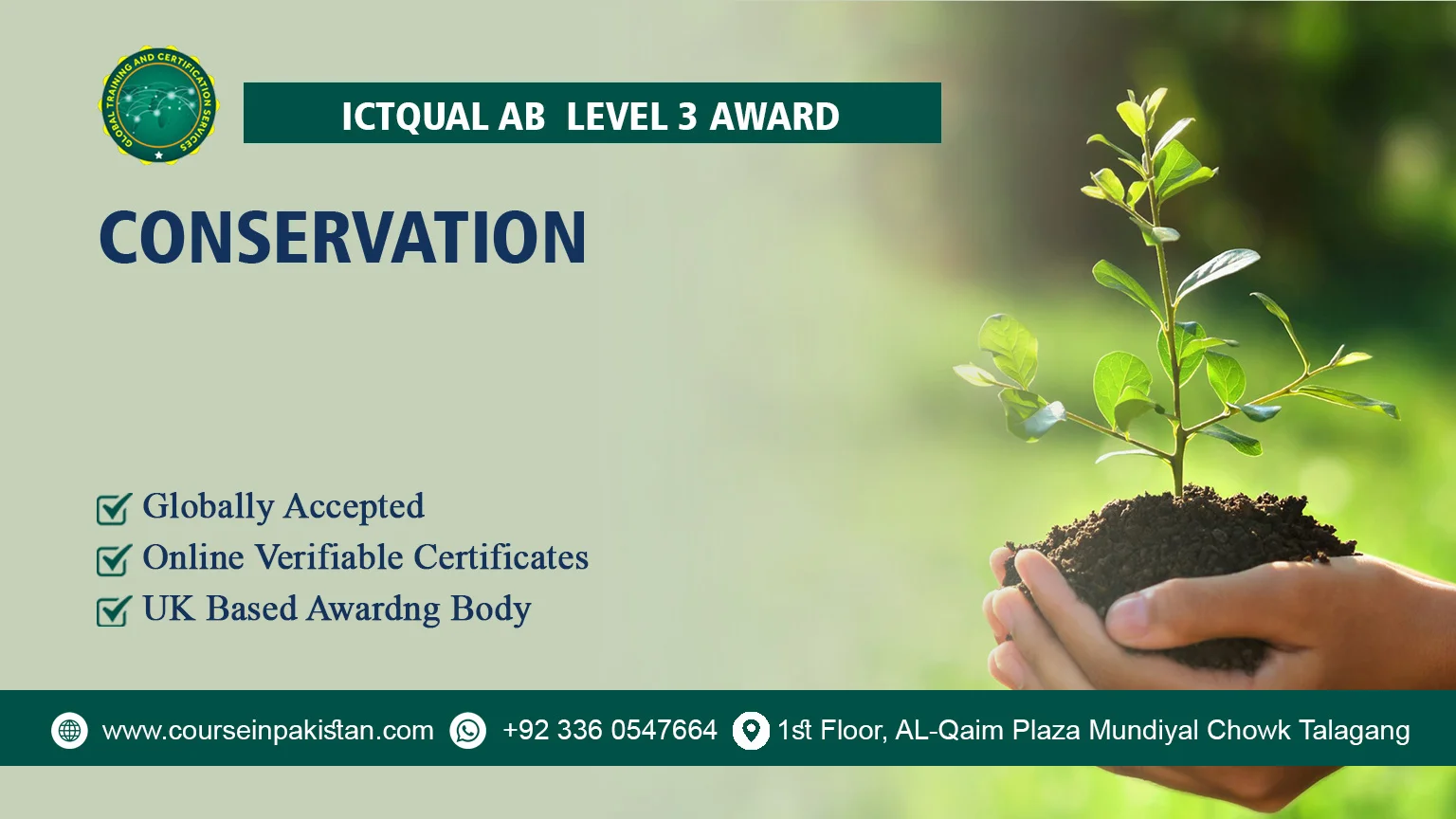
ICTQual Level 3 Award in Conservation
Are you passionate about preserving biodiversity and safeguarding our natural ecosystems? The Level 3 Award in Conservation provides a comprehensive platform for individuals eager to delve into the principles, practices, and challenges of conservation biology. Whether you’re considering a career in wildlife management, habitat restoration, or environmental advocacy, this course offers valuable insights and skills to make a positive impact on our planet’s future.
Course Introduction
The Level 3 Award in Conservation explores the critical role of conservation biology in addressing global environmental challenges. Participants will delve into the intricacies of biodiversity conservation, habitat management, and sustainable practices essential for maintaining ecosystem health and resilience. This qualification serves as a stepping stone for individuals looking to deepen their understanding of conservation principles and contribute meaningfully to environmental stewardship.
Course Overview
Throughout this course, participants will engage in theoretical studies and practical fieldwork to develop a holistic understanding of conservation biology. Emphasis is placed on biodiversity assessment, habitat conservation strategies, and the socio-economic dimensions of conservation efforts. By integrating scientific knowledge with practical skills, learners will be equipped to tackle complex conservation issues and advocate for sustainable solutions.
Course Benefits
- Comprehensive Knowledge: Gain expertise in conservation biology, habitat management, and biodiversity assessment.
- Career Advancement: Enhance your employability in conservation organizations, wildlife reserves, governmental agencies, and environmental consultancy firms.
- Practical Skills Development: Acquire hands-on experience in ecological surveys, habitat restoration techniques, and conservation planning.
- Impactful Contributions: Contribute to global conservation efforts and promote sustainable practices for future generations.
Course Study Units
The Level 3 Award in Conservation covers essential topics, including:
- Fundamentals of Conservation Biology
- Wildlife Conservation and Management
- Ecosystem Restoration and Rehabilitation
- Conservation Policy and Governance
- Community-Based Conservation
- Climate Change and Conservation
- Field Methods and Research Techniques
Learning Outcomes
Study Unit: Fundamentals of Conservation Biology
- Learning Outcomes:
- Explain the principles and goals of conservation biology.
- Analyze factors influencing biodiversity loss and ecosystem degradation.
- Discuss the importance of genetic diversity and population dynamics in conservation efforts.
Study Unit: Wildlife Conservation and Management
- Learning Outcomes:
- Evaluate threats to wildlife populations, including habitat loss, poaching, and climate change.
- Develop strategies for wildlife conservation and species recovery.
- Implement effective wildlife management practices to promote sustainable populations.
Study Unit: Ecosystem Restoration and Rehabilitation
- Learning Outcomes:
- Identify degraded ecosystems and assess restoration potential.
- Plan and implement ecosystem restoration projects using ecological principles and techniques.
- Monitor and evaluate the effectiveness of restoration efforts in enhancing biodiversity and ecosystem services.
Study Unit: Conservation Policy and Governance
- Learning Outcomes:
- Analyze the role of policies and regulations in conservation initiatives.
- Evaluate the effectiveness of conservation governance structures at local, national, and international levels.
- Advocate for evidence-based conservation policies and practices that promote biodiversity conservation and sustainable development.
Study Unit: Community-Based Conservation
- Learning Outcomes:
- Discuss the principles of community-based conservation and stakeholder engagement.
- Collaborate with local communities to develop conservation initiatives that align with cultural and socioeconomic needs.
- Evaluate the social and ecological outcomes of community-based conservation projects.
Study Unit: Climate Change and Conservation
- Learning Outcomes:
- Examine the impacts of climate change on biodiversity and ecosystems.
- Develop adaptation and mitigation strategies to enhance ecosystem resilience.
- Advocate for climate-smart conservation practices that address both biodiversity conservation and climate change challenges.
Study Unit: Field Methods and Research Techniques
- Learning Outcomes:
- Apply field survey techniques to assess biodiversity and habitat conditions.
- Collect, analyze, and interpret ecological data using appropriate research methods and tools.
- Communicate research findings effectively through scientific reports and presentations.
These learning outcomes provide a comprehensive framework for developing expertise in conservation biology, wildlife management, ecosystem restoration, and policy advocacy. They equip learners with the knowledge and skills necessary to address complex conservation challenges and contribute to sustainable environmental management practices.
Who Is This Course For?
The Level 3 Award in Conservation is suitable for:
- Aspiring Conservationists: Interested in pursuing careers in wildlife conservation, habitat restoration, or ecological research.
- Environmental Scientists: Seeking to specialize in conservation biology and biodiversity management.
- Conservation Practitioners: Looking to enhance their skills and knowledge in effective conservation strategies.
- Students and Researchers: Eager to explore opportunities in wildlife management, environmental consultancy, or governmental conservation agencies.
Future Progression for This Course
Upon completing the Level 3 Award in Conservation, learners can progress to:
- Level 4 Certificate/Diploma in Conservation Biology: Further specialization in specific areas such as marine conservation, endangered species management, or ecosystem restoration.
- Higher Education: Pursue advanced studies in conservation biology, ecology, or related fields at universities or research institutions.
- Professional Development: Attend workshops, gain certifications, or participate in internships to strengthen practical skills and broaden career prospects in conservation science.
The Level 3 Award in Conservation empowers individuals to become advocates for biodiversity conservation and sustainable environmental practices. Whether you aspire to protect endangered species, restore degraded habitats, or influence conservation policies, this course equips you with the knowledge and skills needed to make a meaningful difference in our natural world. Ready to embark on a journey of conservation and environmental stewardship.






